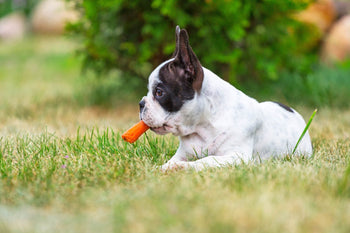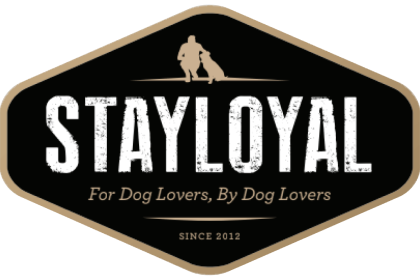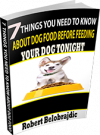Safe Edible Chews For Puppies

Regardless of the breed of your new puppy, one thing is for sure – it’s going to chew. Puppies use their mouths to learn about their world, starting from when they are born and their eyes are not yet open. They use their mouths in the same way a toddler uses his hands: to explore. As they get older, the urge to chew comes from teething – first as the baby teeth come in and then again when they lose them and get their adult teeth. So how do you save your belongings and yourself from those razor-sharp puppy teeth? Do so by making sure your puppy has appropriate chews to gnaw on!
Commercial Chews
Let’s start with commercial, store bought chews. Pet stores are full of things for your dog to chew on – from “dental sticks” to rawhide chews and even vegetarian options like dehydrated sweet potato. So, what’s a safe chew for a puppy?
Don’t feed rawhide. To any dog, any age. You can just skip right by all those “treats.” Rawhide is extremely hard for your dog to digest. Dogs also tend to break of large chunks, which pose choking and blockage risks.
After you have eliminated the “obvious” bad chews, it’s important to read the labels. Many commercial chews actually say they are not for dogs under 6 months or so. For example, Greenies, a very popular chew, says they are not suitable for dogs less than 6 months. WHIMZEES, an all-natural and grain-free chew, says they are not suitable for dogs under 9 months of age!
Puppies get their puppy teeth at around 4 weeks. These teeth then begin to fall out around 14-30 weeks (approximately 3.5 to 7.5 months old) and are replaced by adult teeth. This means that commercially made chews will be no help to you during your puppy’s strongest chewing phase!
So, what store-bought chews are safe?
Manufactured treats such as dehydrated sweet potato or salmon skin, however, are fine to give a teething puppy and are much safer than rawhide or other manufactured chews that are compressed into super hard bones. A puppy’s jaw is still developing during this period, and chews that are extremely hard (like the WHIMZEES and Greenies, or compressed bones and rawhide) can actually damage the formation of your puppy’s incoming adult teeth. They can also crack them as well!
So, if you want to buy treats, stick with the one ingredient dehydrated items. They are soft and don’t last as long, but still give your dog the chew they need, without any risks. For teething puppies, putting them in the freezer first can add some pain relief. Just remember to limit how many give you a small puppy, 1 to 2 a day is plenty.
Homemade Chews
Making chews for your dog is cheaper, you can cater to any allergies, and usually results in a safer product for your puppy.
You can save money by buying a dehydrator and making dehydrated sweet potato strips, salmon skin, even thin sliced chicken or beef. Again, freezing them afterward can help with a bit of pain relief on sore gums. Wrapping chicken around the sweet potato makes for a longer-lasting chew once it’s dehydrated.
Another option is to freeze a carrot (make sure the size fits your puppy – it should not be so small as to pose a choking hazard). For super tiny puppies, frozen whole green beans may be a good choice as well.
And there are raw meaty bones. These are a personal choice, some people like them, some do not. Raw meaty bones are what wild “dogs” such as dingos and wolves would eat to satisfy their chew cravings. Raw bones are good because they are not so hard that they will cause problems with the incoming adult teeth, and the fleshy exterior and tendons can soothe gums while helping loosen stubborn baby teeth, especially the canines.
Just remember to keep size in perspective, both a bone too small and too big can be an issue. For really small puppies, a wing tip might be enough. Large dogs may need beef brisket or lamb necks instead of chicken bones, which could be too small and pose a choking hazard.
Safety First!
With any chew you give your puppy, remember there are hazards. Choking and blockage is always a risk – if you notice your dog is not chewing small bites, but swallowing big chunks, it’s time to take the item away and try something else. It’s best to not leave your puppy unattended with anything potentially hazardous, that includes chews. If you do suspect your puppy is having trouble and may be blocked or choking, rush to the vet immediately. While there are risks, thousands of puppies eat chews every day with no issue. So be smart, avoid the bad stuff and watch your puppy. Do this, and your entire household will survive the chewing phase of puppyhood.








